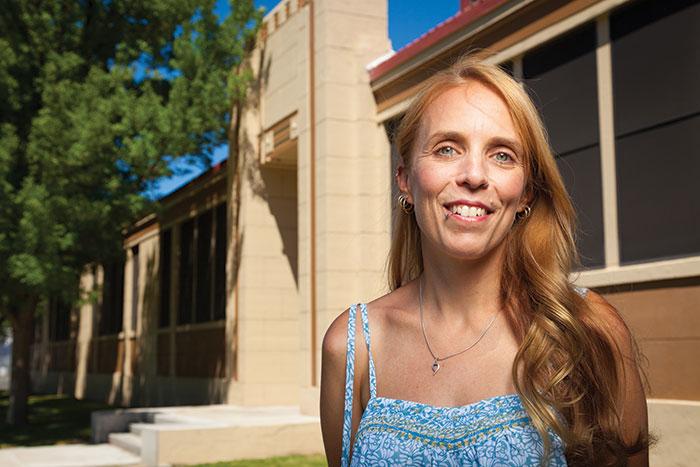
I was staying in a hotel. Not a nice hotel, just a hotel. The kind where the lamps are bolted to the bedside tables and the glasses beside the bathroom sink covered in plastic wrap ripped from the roll. It was a hotel in a town where I’d lived not too long ago. I’d taught there and had met kids with more and less than I’d ever known.
It was nearly 1 a.m. by the time I pulled into the parking lot. I went into the lobby and rang the buzzer to get a key to the room where dogs are allowed. That is who I was with: my black Lab. He needed to go out. I was standing, admiring the moon, waiting on my dog to finish sniffing around the base of a tree, when I heard my name. I knew the voice but couldn’t place it.
The shadow of a man bounded down the stairs from the second floor of the hotel. It wasn’t until he stepped into the puddle of streetlamp light that I recognized him. This man had once been a boy who sat at a table at the back of my class—he and his younger brother, always side by side in jeans three sizes too big that hadn’t made the acquaintance of a washing machine even once.
His life between then and now hadn’t been good. His father still hit. His mother had gotten better at forgetting how to cry. His brother wasn’t so quiet anymore. He’d learned to yell. Just like Dad.
For this student, it had been meth that made ashes of his life, leaving him here, in this hotel. He could stay as long as he cleaned the parking lot. That’s what the manager said.
He bent down to stroke my dog’s ears. “Do you remember that book? The first one we read?”
I did. We’d gotten a classroom set. Brand new for kids who swore they never read.
“I got sent to GED after you left. I could see the library from my desk. One day, I just went in and checked that book out. You know, the one we read?” He smiled, embarrassed. “I guess I didn’t really check it out. I kind of took it. I’ve still got it. Sometimes I sit down and read it. Did you know it was the first book I ever read all the way through?” He paused. “I guess I should take it back. Do you think I should?”
“No,” I said. “Keep it. That book is exactly where it should be.”
Teaching is hard. Working with alternative learners is even harder. I have been doing it for 10 years. My students struggle with housing and food insecurity, mental health issues and substance abuse. Given these challenges, I sometimes wonder if what I do as a teacher matters. What good will a book do a teen who doesn’t know where they’re going to sleep?
When I see former students, like the one I reunited with in that parking lot, I am reminded of how important a positive classroom experience is for our most vulnerable learners. At school, they can take risks and form connections. Seated at their desk with a book in hand, they are more than the circumstances that surround them.
I know the barriers that life has placed in front of my students will not disappear when they walk out of my classroom. Their lives will continue to be hard. My hope, however, is that when they pick up a book, they will remember what it felt like to succeed.
Catherine Alene teaches language arts at the Central Oregon Intergovernmental Council’s alternative high school in Bend, Oregon.
Share Your Story
We want to hear what motivates you to get up each morning and serve students in our nation's schools. Send your 600-word submission for the "Why I Teach" column to us here.